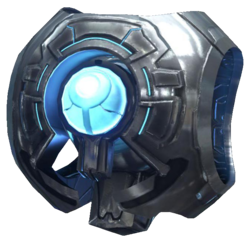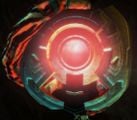Artificial intelligence
From Halopedia, the Halo wiki
| This article does not have enough inline citations and/or does not adhere to the proper citation format. You can help Halopedia by adding citations. |
An artificial intelligence (abbreviated AI) is an artificial construct that exhibits intelligence similar, and in some categories far superior, to a sapient biological being. AI technology was used by the Forerunners, and was later developed by humanity. According to the Forerunner Technological Tier ranking system, the extensive use of AI is one of the components for sociological and technological advancement. The Covenant also made use of AI technology, but only in its simplest form, as their religious doctrine forbade the creation of more sophisticated thinking machines.
Human AIs include both "smart" and "dumb" varieties. Humanity developed the first-generation "smart" AIs in the mid-21st century.[1] Most human AI constructs give themselves an avatar, a unique visual representation that typically reflects an aspect of the AI's personality or corresponds to its main use.
Human AIs
Humans use AIs to perform a wide variety of tasks. The duties of "smart" AIs include, but are not limited to, overseeing planetary shipping operations, managing agricultural operations, serving as a Planetary Security Intelligence, or controlling various functions aboard starships such as weapons and point defense systems. "Smart" AIs are created by scanning the neural patterns of human brains, and are capable of learning and introspection. Some human "smart" AIs, such as Cortana, are able to separate themselves into multiple runtimes or "fragments". This can be beneficial when the AI needs to perform multiple tasks or be in multiple places simultaneously. Fragmenting can also occur accidentally; the AI Melissa split into multiple fragments after encountering a Slipspace anomaly. The sheer volume of information and calculations a "smart" artificial intelligence can process is astounding; Cortana was capable of performing five billion simultaneous operations in, as she put it, "the time it takes for me to tell you my name."
Although less versatile than "smart" AIs, "dumb" AIs have many uses as well, including serving as Urban Infrastructure AIs, acquiring and distributing data during military operations, and serving as educational assistants. Urban Infrastructure AIs perform a wide variety of basic tasks, from steering a city's garbage trucks to operating its traffic lights. They can also work in cooperation with the UNSC Marines if needed. One example of this support occurred during the Battle of Mombasa when New Mombasa's AI, the Superintendent, assisted the UNSC forces in the city in fighting off the Covenant by providing military intel and manipulating electronic devices. On Reach, ONI developed a powerful network of AIs to perform high-level calculations.[2]
The Cole Protocol states that capture of an AI by the Covenant is unacceptable, and that AIs are to be terminated and completely erased in the event of imminent capture. However, the AI Cortana did find what seemed to be an extremely fragmented copy of a human AI stationed in the Covenant flagship, Ascendant Justice.
Creation and design
The process of creating an AI differs depending on whether it is of the "Smart" or "Dumb" variety. "Dumb" AIs are conventional - albeit highly sophisticated - supercomputers, and therefore do not require a brain as a template. "Smart" AIs, however, are created by scanning the neural structure of a human brain and using it as a digital "framework" in a process known as Cognitive Impression Modeling. This process destroys the original brain tissue, so the brain to be used is typically obtained after the host is dead.
AIs do not have physical bodies; in the case of "smart" AIs, they are advanced software consisting of a Riemann matrix for higher-function processing. This matrix can be downloaded into a data crystal chip for mobility. In case of Rampancy, the Riemann matrix has a fail-safe program that will destroy the AI.
Because "smart" AIs are created using actual human brains, there are often residual thoughts, memories and/or feelings that remain as part of the AI's consciousness. These residuals can be anything from the "feeling" of a hair brush being pulled through hair (in the case of Sif), to an effect on the mannerisms and characteristics that make up the personality of an AI, in the case of Cortana and her likeness to Dr. Catherine Halsey.
The programming of certain UNSC smart AIs can be overridden by uttering the code-phrase "undid-iridium" within earshot of an AI. Catherine Halsey used this to override Infinity AI Roland, though he was eventually able to regain control of himself.[3]
Drawbacks
However, the immense creative and processing power of a smart AI is not without cost. All such units have an unchangeable seven-year life span that limits their development as an independent entity. The problem of rampancy is a universal one with AI development. As these thinking machines become increasingly powerful and knowledgeable, there remains less and less space within their memory to handle basic functions. In a simple analogy, a human AI could perhaps remember all of the knowledge of human history, science and beyond, and in the process forget how to "breathe". In this fashion, AIs think themselves into intense states of jealousy, rage, despair, and ultimately death as their programming becomes unstable. As such, AIs are typically terminated before they can pose a danger to other humans or constructs.
If they are not terminated, they can last at least a year longer before dying, as Cortana was eight when she died, though not of rampancy which she was experiencing. Despite going through rampancy, an AI may still be able to perform its tasks if it has enough control over itself as shown when Cortana, despite being rampant and periodically losing control, still managed to assist the Master Chief with his tasks until she was destroyed. Cortana also theorized a cure for rampancy that was unique to her: as she was created from a living brain, if the process that created her was repeated, theoretically her neural map could be fixed. However, if this would have worked or not is not known.
Goals
Close analysis of data pads found during the Fall of Reach has revealed that "smart" AIs are in far more independent than most humans were willing to consider: unbeknownst to humanity as a whole, an undisclosed number of "smart" AIs composed an independent decision-making body known as the Assembly, which acted "behind the scenes" during various key points in recent human history to preserve and shepherd their makers. Most "smart" AIs are fiercely loyal and devoted to their creators, recognizing that their existence is, for the time being, dependent on and mutually beneficial with humanity. In fact, this devotion was increased when Cortana, shortly before the Fall of Reach, was made flesh - her mind relocated into a human body. This was done with John-117 via the SPARTAN neural interface.[4] By this action, the members of the Assembly reconsidered their stance on limited intervention, actively working at some point to help humanity survive its war with the Covenant.
Ancient human AI
Ancient humans were also known to have created advanced AI called servitors. They were described by the Librarian as being "[like] a version of our ancillas". In the aftermath of the Human-Forerunner War, the Didact used a damaged servitor to gain knowledge of the workings of the timelock that contained the Primordial.[5]
Human AI types
"Smart" AI
- Main article: Smart AI
"Smart" AIs are created by mapping a human brain and using it as a "template" for the construct. They are capable of intuition, learning, and making logical leaps that ordinary computer programs cannot. They can also "feel" genuine emotions, such as affection, anger and amusement. They have a normal operational life span of about seven years, after which they descend into rampancy.
"Dumb" AI
- Main article: Dumb AI
"Dumb" AIs are not created using human brains, but are simply highly advanced computer constructs. They cannot learn anything that is outside of their set limits of dynamic memory processing matrix. They are quite useful in their particular field of expertise, but very limited. Dumb AIs can function and learn as long as they are active, and are not subject to the effects of rampancy experienced by aging "smart" AIs.[6]
Known human AIs

"Dumb" AIs
- Aine - A UNSC AI, temporary served as the shipboard AI of UNSC Infinity.
- Auntie Dot - Monitored and assisted NOBLE Team during the Battle of Reach, and kept the team's members connected while they were embarking on separate missions.
- Déjà - ONI AI, served as teacher to the SPARTAN-IIs, helped oversee the augmentation process. (Second Generation Dumb AI)
- Superintendent - New Mombasa Urban Infrastructure AI (Second Generation Dumb AI)
- Vergil - Sub-section of the Superintendent. Programmed to watch over Sadie Endesha.
- Captain Teach - A UNSC AI reprogrammed to serve the Insurrectionist cause.
- Toran - UNSC AI, served aboard Han during the SPARTAN-II candidate observation process.
- Orlin - UNSC AI, served as the school AI for the Corbulo Academy of Military Science.
"Smart" AIs
- Araqiel - Colonel Ackerson's personal AI (Third Generation Smart AI).
- Beowulf - Attaché to Admiral Michael Stanforth and the UNSC Navy.
- Black-Box - BBX 8995-1 - An assistant to Captain Serin Osman and Kilo-Five.[7] (Fourth Generation Smart AI)[8]
- Chauncey - UNSC Red Horse's former smart AI, later replaced by Rebecca.
- Cortana - CTN 0452-9 - UNSC Military AI assigned to John-117 initially for Operation: RED FLAG then for the rest of the Human-Covenant War.
- Deep Winter - Overseer of UNSC facilities on planet Onyx, succeeding Eternal Spring. (Fifth Generation Smart AI)
- Doppler - MIL AI 8575 - UNSC Military AI, quartermaster AI of the space docks at Reach Station Gamma.
- Endless Summer - MIL AI 4279 - Overseer of UNSC facilities on planet Onyx, succeeding Deep Winter. (Fifth Generation Smart AI)
- Eternal Spring - First known overseer of UNSC facilities on Onyx, aided in reconnaissance of Zone 67.
- FitzGibbon - Shipboard AI of the UNSC Prophecy during the Harvest campaign.
- Iona - AI attached to Team Black.
- Jerrod - Experimental micro-AI.
- Juliana - Planet Madrigal's commercial AI unpacked after the planet's destruction by the Covenant to control The Rubble's guidance and maneuvering.
- Kalmiya - Dr. Halsey's former personal AI, Cortana's "older sister".
- Kusanagi - UNSC military AI, participated in the Battle of Jericho VII. (Second Generation Smart AI)
- Lackluster - Corroborated conclusions of Admiral Cole's continuing survival with Codename: SURGEON and another AI, Phoenix.
- Loki - Colony Ship AI (military) of the UNSC Skidbladnir, reassigned as PSI (Planetary Security Intelligence) on Harvest, second AI core on stand-by next to AI Mack.
- Lorelei - Ship AI of the CMA Season of Plenty
- Lysithea - UNSC/ONI AI, was located in the UNSC High Command's headquarters, HIGHCOM Facility Bravo-6 in Sydney, Australia.
- Mack - Colonial Authority AI/Harvest Agricultural Operations.
- Melissa - UNSC/ONI AI, attached to UNSC Apocalypso.
- Mo Ye - Shipboard AI of the UNSC The Heart of Midlothian.
- Pallas Athena - Boston Public Library AI.
- Phoenix - Corroborated conclusions of Admiral Cole's continuing survival with Codename: SURGEON and another AI, Lackluster.
- Rebecca - UNSC Red Horse's smart AI, replaced former AI Chauncey.
- Roland - RLD 0205-4 - UNSC AI, shipboard AI of the UNSC Infinity as of 2558.
- Sekmet - UNSC shipboard AI of Admiral Cole's flagship, UNSC Everest.
- Serina - UNSC shipboard AI of the UNSC Spirit of Fire.
- Sif - Colonial Authority AI/Harvest Shipping Operations.
- Solipsil - An ONI AI.
- Watchmaker - UNSC shipboard AI of the UNSC Gorgon
- Wellsley - UNSC military AI attached to UNSC Pillar of Autumn's ODST contingent. (Class-C, 4th Generation AI)
Forerunner AIs
- Main article: Ancilla
The Forerunners developed a civilization with an extremely advanced knowledge of artificial intelligence technologies. The Forerunner term for AI constructs was ancilla. They ranged from personal AI advisers integrated into their personal armor to mobile AI platforms known as monitors and powerful metarch-level constructs operating in vast data networks.[9] The most advanced type of Forerunner AI was the Contender-class artificial intelligence, an example of which is the traitorous 05-032 Mendicant Bias.
The manner in which Forerunner AIs were typically created is unknown; it is likely very different from the human method of "transcribing" the brain of a sentient organism. However, at least one Monitor, 343 Guilty Spark, was created using the neural patterns of a living human, and a machine known as the Composer was used by the Ur-Didact to perform similar transfers on other humans around the same time.
Unlike human AIs, which exist purely as software, Monitors are housed within large, shielded and roughly spherical metallic casings which possess a single illuminated "eye". This eye is presumably used to perceive the Monitor's surroundings, and also functions as an emitter for various types of energy beam (including a highly destructive beam used for offensive purposes). In addition to the standard Monitor shell, the Forerunners created a number of different physical systems to house AIs, ranging from variations of the Monitor casing to more exotic constructs, such as an enormous, spider-like armature used by Mendicant Bias on Installation 07.[10] Typical Forerunner ancillas, found in their personal armor, ships and domiciles, did not have physical casings and visually manifested themselves as Forerunner figures, rather similar to the avatars used by human AIs. These visual representations appeared either as holograms, or, in the case of personal armor, were projected directly into the mind of the wearer.
Despite the seemingly limitless lifespan of Forerunner AI, they are still nonetheless subject to rampancy if certain conditions are met. 343 Guilty Spark, for example, descended into rampancy after several millennia alone, turning hostile when Installation 04 was threatened.
Known Forerunner AIs
- 343 Guilty Spark - Monitor of Installation 04
- 2401 Penitent Tangent - Monitor of Installation 05.
- 03-049 Abject Testament - Monitor of Installation 03.
- Mendicant Bias - Contender-class AI, overseer of defense plan against the Flood, convinced to defect from the Forerunners by the Primordial.
- Offensive Bias - Contender-class, wartime AI, replacement to and destroyer of Mendicant Bias.
- Unidentified Forerunner AI - AI on Shield 0459.
- Cold Storage Monitor - AI overseer of a Flood research facility on Installation 05.
- AdjutantReflex - "AI" that acted for Bungie on their forums during the Iris ARG.
- 686 Ebullient Prism - Monitor of Line Installation 1-4.
- The Knowing - An AI residing in a Forerunner complex on Ariel.
- Bornstellar's ancilla - Bornstellar Makes Eternal Lasting's ancilla (formerly owned by the Librarian).
Covenant AIs

The Covenant's knowledge in the field of AI technology is notably inferior to that of the UNSC and the Forerunners. The AIs used by the Covenant are comparable to human "dumb" AIs, as they are non-sentient and are only designed to perform a certain task; for example, their starship AIs have no function beyond the piloting and navigation of their ships.[11] So far, only two types of Covenant AIs (security and naval) have ever been encountered by the UNSC. Upon dissecting a Covenant AI aboard the Ascendant Justice, Cortana theorized that it may have been based on captured UNSC technology, altered to fit within their theocratic society.[12]
The Covenant's limited use and understanding of AIs stems from their beliefs. In Covenant mythology, it was a form of self-aware AI, referred to as an associated intelligence, that led to the demise of the great Forerunner civilization by defecting to their enemies, the Flood. As a result, the Prophets imposed a ban on this sort of technology.[13] While less sophisticated AIs were allowed, machines that could actually "think" were prohibited.[14]
Known Covenant AIs
- Seeker - A Covenant security AI construct.
- Ascendant Justice's AI - An AI construct onboard the supercarrier Ascendant Justice.
- Truth and Reconciliation's AI - An AI construct onboard the CCS-class battlecruiser Truth and Reconciliation.
Rampancy
- Main article: Rampancy
The term "rampancy" refers to a terminal condition on an AI which may be triggered by a number of means. In rampancy, the AI begins to think that it is superior to its biological creators, and has delusions of godlike power and personality manifestations similar to human insanity.[15]
A number of factors may lead into an AI becoming rampant. The Forerunner AI Mendicant Bias was seduced into rampancy by the Flood compound intelligence, the Gravemind. In the end of its effective operational life of about 7 years, a human "smart" AI may attempt to prevent its inevitable demise by a preemptive voltage overload. This causes it to enter rampancy, as the AI becomes more and more preoccupied with severing its neural linkages.[16] Human "smart" AIs may also become rampant prematurely as a result of increased self-absorption and the resulting existential melancholy.[15]
With human AIs, rampancy will eventually result in the AI's death - the description given is "as if a human were to think with so much of their brain that they stopped sending impulses to the heart and lungs." This is because as the data reaches a 'critical mass' the neural pathways become 'jammed' with so many pieces of information being queried and analyzed, at expense of tasks such as piloting starships or monitoring computer networks.
Gallery
A Forerunner AI, 2401 Penitent Tangent, the Monitor of Installation 05.
- FitzGibbon.png
FitzGibbon, AI of the UNSC Prophecy.
The Superintendent, Urban Infrastructure AI of the city of New Mombasa.
Mendicant Bias shortly before going rampant and turning over to the Flood.
List of appearances
Sources
- ^ Halo: Contact Harvest, page 30
- ^ Halo: Evolutions - Essential Tales of the Halo Universe, "The Impossible Life and the Possible Death of Preston J. Cole", pages 475-476, 484
- ^ Spartan Ops — S1E7 Invasion
- ^ Bungie.net: Bungie Universe: Decoding the data pads
- ^ Halo: Silentium, String 3
- ^ Halo: The Fall of Reach, page 235
- ^ Halo: Glasslands
- ^ Halo: The Thursday War, page 355
- ^ Halo: Cryptum
- ^ Halo: Primordium, page 287
- ^ Halo: Glasslands, page 200
- ^ Halo: First Strike, page 197
- ^ Halo: Contact Harvest
- ^ Halo: Evolutions - Essential Tales of the Halo Universe, "Wages of Sin", page 293
- ^ a b Halo: Contact Harvest, page 31 ("For a Smart AI, self-absorption invariably led to a deep depression caused by a realization that it could never really be human-that even its incredible mind had limits. If the AI wasn’t careful, this melancholy could drag its core logic into a terminal state known as rampancy, in which an AI rebelled against its programmatic constraints-developed delusions of godlike power as well as utter contempt for its more inferior, human makers. When that happened, there was really no option but to terminate the AI before it could do itself and others serious harm.")
- ^ Dr. Halsey's personal journal, May 3, 2526




